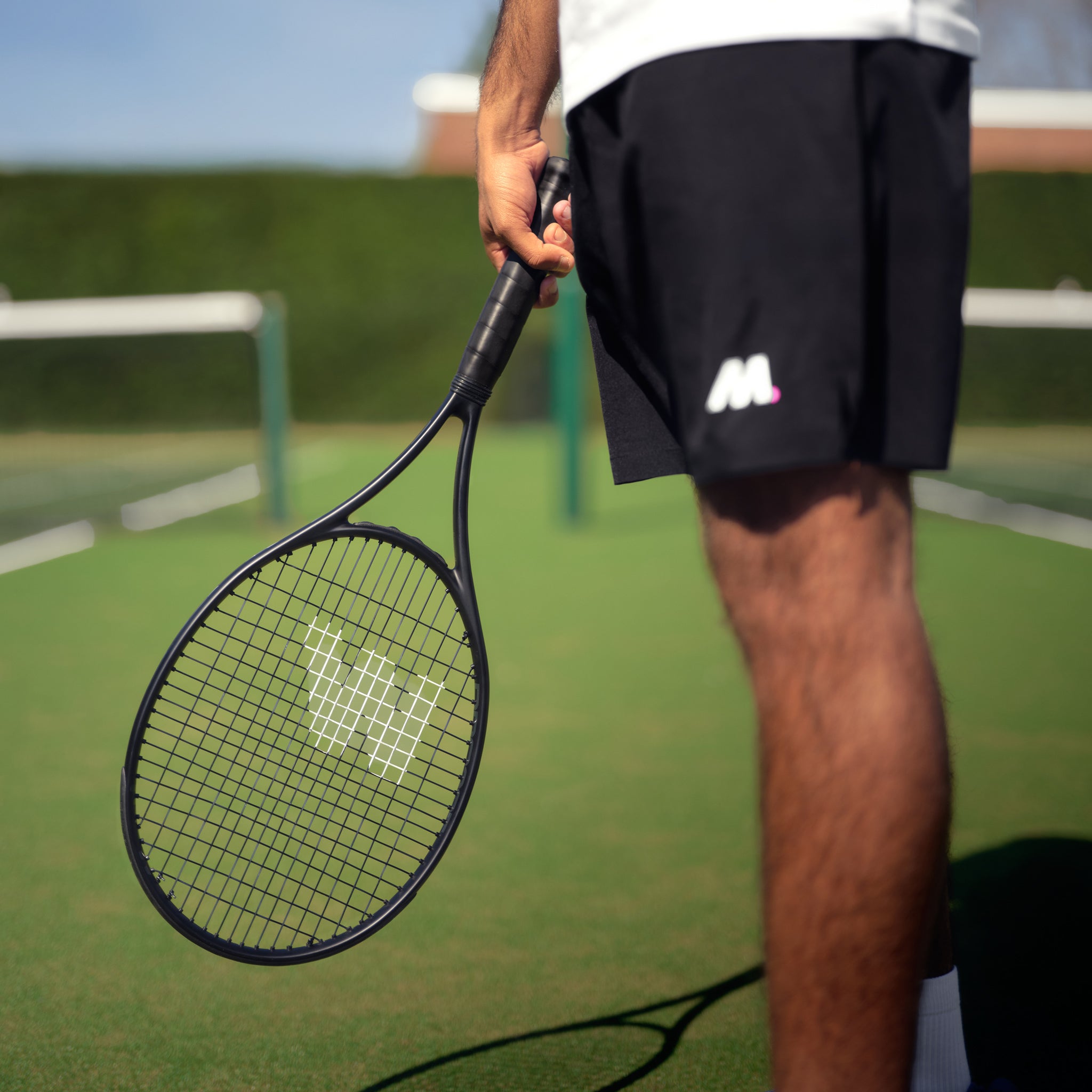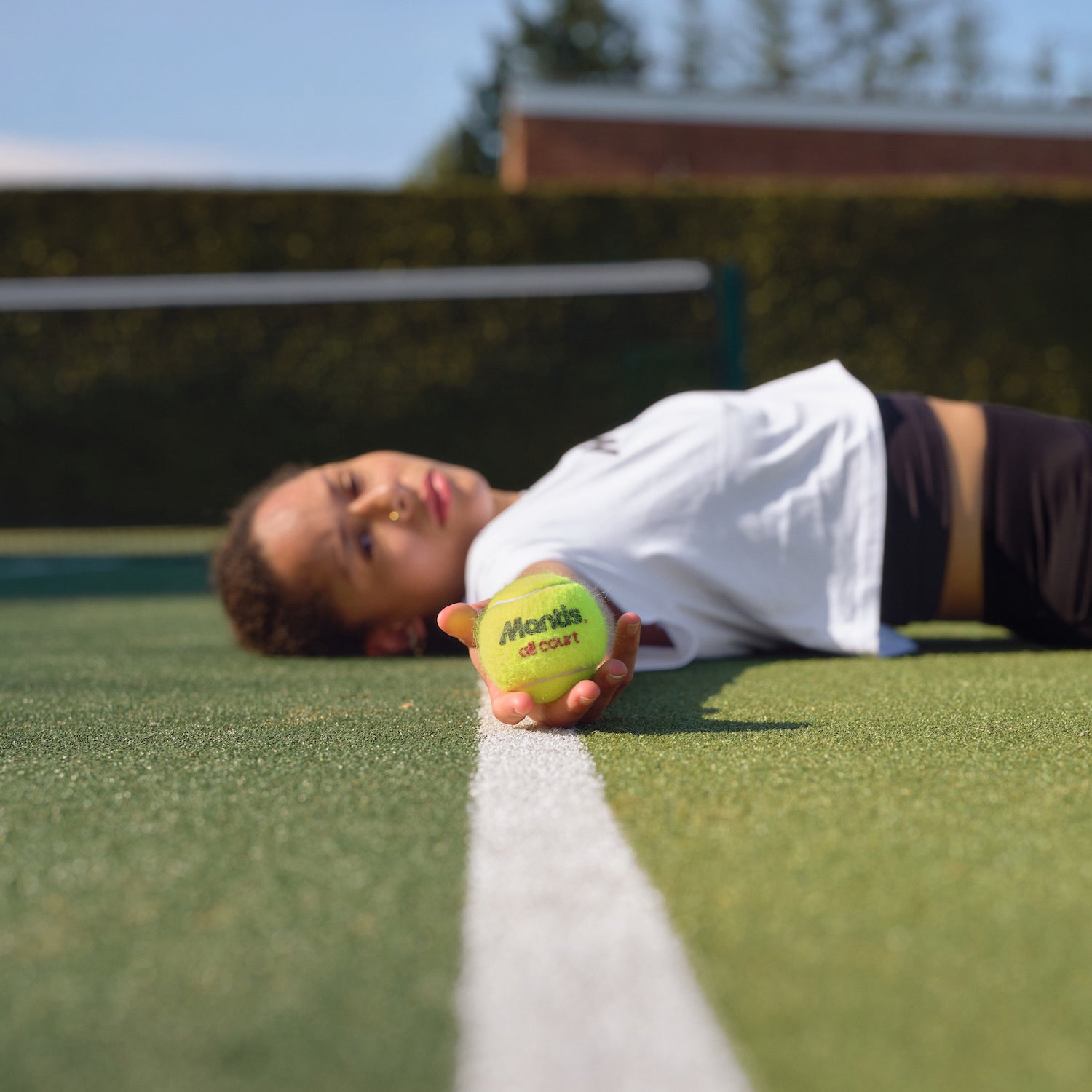
Finding professional tennis coaching isn't just about learning a few drills; it's about finding a genuine partner for your journey in the sport. A modern coach is a strategist, a motivator, and a technical wizard all rolled into one, crafting a plan that fits your specific game. Here at Mantis, we believe that really understanding what a coach does is the first step to reaching your potential on the court. While many are exploring options like online tennis instruction, the value of hands-on, personalised guidance is hard to beat.
What to Look for in professional tennis coaching
Choosing a tennis coach is one of the biggest investments you can make in your game. It’s about much more than just hitting balls back and forth. You're looking for an expert who can see the game through your eyes and build a bridge from where you are now to where you want to be.
Today’s coach does far more than just fix your forehand grip. Think of them as a diagnostic expert, someone who meticulously analyses your strengths, weaknesses, and even your on-court habits. This deep dive is what forms the foundation of a truly effective improvement plan.
Beyond Drills to Development
A great coach knows there's no such thing as a one-size-fits-all approach. Their methods have to be fluid and adaptable, changing to meet the specific needs of the player standing in front of them.
- For Junior Players: The focus is usually on building solid fundamentals. It’s about fostering a love for the game and developing coordination in a fun, engaging way.
- For Competitive Adults: Here, the coaching naturally shifts towards advanced strategy, mental toughness, and fine-tuning shot patterns to pick apart an opponent's weaknesses in a match.
This adaptability is everything. A coach who can break down complex biomechanics for a beginner and then switch gears to discuss intricate match tactics with an advanced player shows a real depth of understanding.
A truly effective tennis coach is a problem-solver. They don’t just spot an issue; they find its root cause—whether technical, tactical, or mental—and give you clear, actionable steps to fix it. This builds confidence, one shot at a time.
The Role of Motivator and Strategist
Technical expertise is the baseline, but what really separates a good coach from a great one is their ability to motivate and strategise. They get the psychological side of tennis, helping you stay positive after a tough loss and focused during a high-pressure point. They effectively become your on-court strategist, teaching you how to read opponents and adjust your game plan on the fly.
To get a better sense of what professional guidance looks like, understanding the diverse role of a personal trainer can offer some interesting parallels. Both roles require a deep commitment to a client's progress, blending technical knowledge with strong interpersonal skills to get results.
Ultimately, your coach is your partner in progress, guiding your journey every step of the way.
Decoding UK Tennis Coaching Qualifications
In the UK, you don't just have to take someone's word that they're a good tennis coach. The whole system is structured by the Lawn Tennis Association (LTA), which sets the standard for coaching quality. Understanding these qualifications is the best way to make sure you're getting expert, credible instruction that actually matches your goals on the court.
A coach’s LTA level tells you a lot about their training, experience, and the kind of players they’re best suited to help. It’s a progressive path, with each level building on the last. Think of it like a ladder they have to climb.
The LTA Coaching Ladder
This ladder gives a really clear picture of a coach's skills and responsibilities. For instance, someone at LTA Level 1 is a Coaching Assistant. They’re qualified to help a more senior coach, usually with beginners and starter groups. It’s a great first step, but they aren't yet able to lead sessions on their own.
Once a coach reaches LTA Level 3, they've shown they can plan and deliver high-quality sessions for all sorts of players, from total beginners to improvers, in both group and one-on-one settings. This is widely considered the industry benchmark for a professional tennis coach.
The journey a coach takes often mirrors the development of their players, with guidance and support being key to unlocking new skills.
This process shows how a coach’s guidance and positive reinforcement are central to helping a player truly master the game.
LTA Tennis Coach Qualification Levels Explained
To make it even clearer, here’s a simple breakdown of the LTA qualifications. This table shows you what each level means and which type of player it's designed for, helping you find the perfect match for your skill level.
| LTA Level | Primary Role | Ideal For Players Who Are |
|---|---|---|
| Level 1 | Coaching Assistant | Just starting out or playing in beginner group sessions. |
| Level 2 | Instructor | Beginners and improvers looking to build fundamental skills. |
| Level 3 | Coach | A wide range of players, from improvers to club-level competitors. |
| Level 4 | Senior Coach | Performance-focused players and competitive juniors. |
| Level 5 | Master Coach | Elite athletes and those on a professional development pathway. |
As you can see, the higher the level, the more specialised the coach’s expertise becomes. It's all about finding someone whose qualifications align with where you are in your tennis journey.
Advancing to Elite Levels
Once you get past Level 3, the qualifications become seriously specialised, focusing on high-performance coaching.
- LTA Level 4 (Senior Coach): These coaches are trained to run entire club programmes or manage teams of other coaches. They have a deep tactical understanding of the game and are perfect for players who are serious about competing.
- LTA Level 5 (Master Coach): This is the pinnacle of UK tennis coaching. Only a small, elite group of coaches hold this qualification. They’re often involved in national player development programmes, shaping the future of British tennis.
It's always a good idea to verify a coach’s LTA accreditation. It’s a quick and simple step that confirms they’ve met national standards for safety, first aid, and professional conduct, giving you complete peace of mind.
For anyone thinking about a career in coaching, it's fascinating to see the structured pathway involved.
Ultimately, choosing a coach with the right LTA qualification ensures their expertise fits your ambition, setting you up for success from the very first lesson.
What Really Makes a Great Tennis Coach?
While an official qualification tells you a coach knows the textbook stuff, it’s their personal qualities that truly make the difference on court. At Mantis, we’ve always believed the best coaching relationships are built on a solid foundation of trust and mutual respect. This is where a good coach becomes a great one, turning lessons into a genuine partnership for your improvement. The real magic happens when technical expertise meets brilliant people skills.
A coaching certificate is just the starting point. It’s the ability to communicate clearly, show unwavering patience, and adapt to each player's unique learning style that separates an average coach from a truly exceptional one. While our range of Mantis tennis balls provides consistency in your practice, it’s the coach who provides the consistent guidance you need to make real progress.
The Power of Clear Communication
A top-tier coach is a master translator. They can take complex biomechanical concepts—like the kinetic chain in a serve—and break them down into simple, understandable instructions that actually make sense. They don't just tell you what to do; they explain why it works, often using analogies and visual cues that click with your way of thinking.
For instance, instead of just barking "snap your wrist," a great coach might say, "imagine you're cracking a whip with the racket head." This kind of clear, relatable instruction makes it far easier to make adjustments and build the right muscle memory.
This skill is about more than just simplifying technique. It's also about giving feedback that builds you up rather than tearing you down.
A great tennis coach delivers constructive criticism with precision and encouragement. The goal is always to build confidence by showing a clear path to improvement, making sure every correction feels like a step forward, not a setback.
Adaptability and Patience
Every single player learns differently. Some are visual learners who need to see a demonstration, while others respond better to verbal explanations or hands-on adjustments. A skilled tennis coach can quickly suss out your learning style and adapt their methods to match. They don't force you into their pre-set system; they find a system that works for you.
This adaptability goes hand-in-hand with patience. Let’s be honest, improvement in tennis is rarely a straight line. There will be frustrating plateaus and moments where a new technique just doesn’t feel right. A great coach gets this.
- They notice the small wins: A good coach will spot your small improvements, even when you don't, and remind you how far you've come.
- They keep it positive: They know how to maintain an encouraging atmosphere, especially when you're struggling through a tough session.
- They aren't afraid to change tack: If a certain approach isn't clicking, they don't get frustrated. They calmly pivot to a new drill or a different explanation.
This patience creates a safe learning environment where you feel comfortable making mistakes—which is absolutely essential for growth. When you're assessing a potential coach during a trial lesson, watch closely for these qualities. Do they listen? Do they adapt? Their ability to connect with you personally is just as important as their technical expertise.
The Real Benefits of Professional Tennis Coaching
Thinking about hiring a tennis coach? It can feel like a big decision, but the payoff is about so much more than just hitting a cleaner ball. Think of it as a serious investment in your entire game, one that fast-tracks your progress in a way that slogging it out on your own never could.
The first thing you’ll notice is how quickly you start to improve. A good coach gives you objective, expert feedback that’s impossible to replicate when you’re just hitting against a wall. You might feel like your forehand is off, but a coach can spot in an instant that your footwork is a fraction too late or your racket preparation is rushed. They see the root cause and give you a clear, immediate fix.
This expert eye is also your best defence against injury. So many common tennis niggles, like tennis elbow or shoulder strains, come from poor biomechanics repeated over thousands of swings. A qualified coach will correct those flawed movements before they become second nature, keeping you on the court and playing safely for years to come.
Developing Your Tactical Mind
Beyond pure technique, a massive part of winning matches is what happens between your ears. A coach acts as your personal tactician, teaching you how to think your way through a point, a game, and a match. They show you how to read the game, spot an opponent's weakness, and construct points with a purpose.
This court craft is built through drills and match-play scenarios designed to sharpen your decision-making under pressure. It's about learning:
- Shot Selection: Knowing when to play the high-percentage cross-court rally versus when it's time to pull the trigger on a down-the-line winner.
- Court Positioning: Understanding the subtle art of where to stand to cut down angles and anticipate your opponent's next shot.
- Adapting Your Game Plan: Realising when your 'Plan A' isn't cutting it and having a 'Plan B' ready to go mid-match.
This mental side of the game is often where players see the biggest leap in their results. You stop just hitting tennis balls and start playing tennis.
The greatest value a coach provides is perspective. They see your game without the emotional baggage, allowing them to pinpoint those stubborn habits and map out a clear, structured path to finally fix them.
At the end of the day, professional coaching builds a more complete and resilient player. It fine-tunes your strokes, sharpens your tactical brain, and gives you the mental toughness to perform when it really counts. All of this translates directly into winning more points and, most importantly, getting far more enjoyment out of your time on the court.
Your Step-by-Step Guide to Finding a Coach
Knowing what you want in a coach is one thing, but how do you actually go out and find them? Choosing the right person is genuinely one of the most important decisions you’ll make for your game, so having a clear plan of action can make all the difference.
Mantis wants to give you a practical framework for finding that perfect coaching match. And if you're just starting out, our guide on tennis lessons for beginners is a great place to get a feel for what to expect in those first few sessions.
First things first: you need to know where to look. The search for a great tennis coach always starts with credible sources, connecting you with professionals who are skilled, properly vetted, and accredited. This step is crucial for making sure you’re working with someone who meets national standards for both safety and coaching quality.
Where to Begin Your Search
Thankfully, your search doesn't need to be a huge, complicated ordeal. There are a few reliable places you can look right now to build a list of potential coaches in your area.
- Your Local Tennis Club: This is usually the easiest and most direct route. Most clubs have their own resident coaches or at least a list of LTA-accredited professionals they trust and recommend.
- The LTA Coach Finder: The Lawn Tennis Association (LTA) has an official online tool that is incredibly useful. Just pop in your postcode, and it will show you accredited coaches nearby, along with their specific qualifications.
- Word-of-Mouth: Don't underestimate the power of a good recommendation. Chat with other players whose game you respect. Hearing about their firsthand experience can give you an invaluable insight into a coach’s style and how effective they really are.
Once you’ve put together a shortlist of a few names, it’s time to dig a little deeper and see who really aligns with your goals.
Key Questions for Every Potential Coach
Before you even think about stepping onto the court for a trial lesson, a quick chat can reveal a huge amount. Think of it as a casual interview where you’re in the hiring seat. This is your chance to get a feel for their approach and see if it clicks with you.
Try asking a few of these questions:
- What’s your coaching philosophy? This gets to the heart of how they think about developing a player.
- What’s your experience with players at my level? You need to know they've successfully helped others with similar goals to yours.
- How do you usually structure a lesson? This gives you a sense of whether their sessions are well-planned and engaging.
- How do you track progress and give feedback? A good coach should have a clear way of offering constructive, actionable advice.
A trial lesson is non-negotiable. It's the only real way to experience a coach's teaching style, communication, and on-court personality. Pay attention to the chemistry – this is a partnership, and you need to feel comfortable and motivated.
By following this simple process – starting with a broad search, asking the right questions, and always doing a trial lesson – you move from hoping to find a good coach to making a truly informed decision. You’ll be in the best possible position to find someone who will genuinely elevate your game and help you hit your goals.
How Elite Coaching Forges Professional Players
If you really want to see what a great coach can do, just look at the professional tour. At that level, coaching isn't just about tweaking a forehand. It's an all-encompassing partnership that can make or break a player's career. These coaches are part strategist, part sport psychologist, and part conditioning guru, all rolled into one. Their job is to take raw, explosive talent and mould it into something that wins championships.
The partnerships you see on Centre Court at Wimbledon are built on years of trust and a singular, shared goal. An elite coach is the one who spots a tiny, almost invisible flaw in a service motion that an opponent might exploit. They're the ones devising complex game plans to dismantle a specific player's strengths and building the mental armour needed to stare down a break point in a Grand Slam final. They are, in many ways, the unseen architects of victory.
What We Can Learn from High-Performance Coaching
You can see the proof of this in the competitive circuits. Take university tennis, for instance, which is a massive breeding ground for the next generation of pros. Coaches who bring these elite-level methods to their teams consistently produce incredible results, showing just how powerful that structured, expert guidance can be.
The fundamental ideas behind elite coaching—setting clear strategic goals, building mental toughness, and relentlessly refining your skills—aren't just for the pros. Any player who wants to improve can borrow this mindset to take their own game to the next level.
So, while you might not be getting ready for the US Open, the lessons from the professional tour apply to everyone. A good local coach brings those same core principles to your court, helping you build a smarter, stronger, and far more resilient game.
Your Top Tennis Coaching Questions Answered
Stepping into the world of tennis coaching can feel a bit daunting, and it's natural to have a few questions. At Mantis, we believe that just like finding the right tennis racket, finding the right coach is a game-changer.
We've put together some straight-talking answers to the most common queries we hear from players. The goal is to give you the clarity you need to take that next step with confidence.
How Much Does a Tennis Coach Cost in the UK?
The price tag for a tennis coach in the UK can swing quite a bit, and it usually comes down to a couple of things. A coach's experience and LTA qualification level are big factors – you’ll naturally pay more for a seasoned Level 4 or 5 coach than a Level 2 instructor who is just starting out. Where you live also plays a huge part; lessons in London will almost always be pricier than in a smaller town.
As a general guide, you can expect to pay anywhere from £25 to £70 per hour for a one-on-one lesson. If you're looking for a more wallet-friendly option, group sessions are fantastic, typically costing between £10 and £20 per person for an hour.
How Often Should I Take Lessons?
This is a classic question, and the honest answer is: it really depends on your ambitions, your budget, and the time you can realistically put in.
- For quick progress: If you're eager to improve fast, a weekly lesson is the gold standard. It keeps the feedback loop tight and helps you build real momentum.
- For steady growth: A lesson every fortnight works brilliantly for many players. It gives you enough time to go away and properly practise what you’ve learned.
- For a tune-up: If you're just looking to iron out some kinks, a monthly session can be perfect for keeping bad habits at bay.
The key takeaway? Consistency beats cramming. A regular lesson every other week will serve you far better than a bunch of lessons packed together followed by a long gap.
Remember, the lesson is where the learning begins. The real magic happens when you take what your coach has shown you and put it into practice on your own time.
How Do I Know If a Coach Is the Right Fit?
You'll usually get a gut feeling after a few trial lessons. A great coach-player dynamic is a partnership, and it all starts with communication. Do you click with their teaching style? Do their explanations make sense to you?
You should leave your sessions feeling energised and motivated, even when the drills are tough. A good coach challenges you but also builds your confidence. Ultimately, you want someone who genuinely gets what you're trying to achieve and has a clear, logical plan to get you there. Racket Business is a useful resource as this free publication goes in depth into the global tennis coaching industry.
At Mantis, we know that great coaching and great equipment go hand-in-hand. Our gear is designed with a single purpose: to give you the precision and feel you need to bring your coach’s lessons to life on the court. Check out our range of performance rackets, balls, and accessories at https://mantissport.com.










